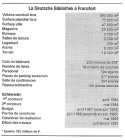Conserver les livres d'aujourd'hui et de tous les temps
- Auteur : Lehmann, Klaus-Dieter
- Résumé en anglais : Germany never had National library strictly speaking. Example of decentralization and cooperation, its library network is based on 70 academic libraries, 7 interregional libraries, regional and special fields libraries. In the Union treaty (october 1990, the 3rd), a law plans to create a public institution with both more important existing collections : the Deutsche Bücherei of Leipzig (1912) and the Deutsche Bibliothek of Francfort (1916) are going to become the « Deutsche Bibliothek », keeping their actual two localizations. Their respective functions are already defined : Francfort, as an information, national bibliography, technical research center... Leipzig as a preservation, edition and printing history one. That requires a new construction in Francfort and a renovation in Leipzig.
- Résumé : L'Allemagne n'a jamais eu de bibliothèque nationale proprement dite. Modèle de décentralisation et de coopération, son réseau de bibliothèques repose sur un ensemble de 70 bibliothèques universitaires, 7 bibliothèques interrégionales, des bibliothèques de Land et des bibliothèques spécialisées. Dans le Traité de réunification du 3 octobre 1990 une loi prévoit la création d'un établissement public réunissant les deux plus grandes collections existantes : la Deutsche Bücherei de Leipzig (créée en 1912) et la Deutsche Bibliothek de Francfort (1916) deviendront la Deutsche Bibliothek, tout en conservant leur localisations actuelles. Leurs rôles respectifs sont déjà répartis : Francfort doit être centrale d'informations, bibliographie nationale, centre de recherche et de développement technique... Leipzig a une mission de conservation, de recherche sur l'histoire de l'édition, de l'imprimerie, etc. Ce qui entraîne une nouvelle construction à Francfort et la restauration du bâtiment de Leipzig.
- Paru dans le numéro : n°5 : Grandes bibliothèques
- Licence de diffusion : Tous droits réservés
- Format : Fichier XML
- Étendue : 37618
- Date de publication : 1991
- Langue : fr
- Sujet(s) : Allemagne , bibliothèque , Deutsche Bibliothek , Deutsche Bucherei , Francfort , Leipzig
- Type de ressource : Text
Ce document est également disponible dans le format suivant :
Document faisant partie de cette ressource :



